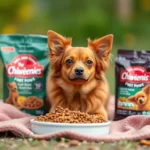
Introduction
Proper nutrition is paramount for all dogs, but the best dog foods for Rat Terriers must cater specifically to their unique needs. Rat Terriers are energetic, intelligent, and have a distinctive physique that requires a tailored diet to ensure they thrive. Understanding their dietary requirements is essential for any owner looking to provide the best care for their furry friend.
Understanding Rat Terriers
Breed Characteristics
Rat Terriers are small to medium-sized dogs, typically weighing between 10 to 25 pounds. They are known for their agility and high energy levels, making them excellent companions for active families. However, their lively disposition can lead to specific health issues if not managed properly through diet. Common concerns include obesity and allergies, which can often be mitigated with the right nutritional choices.
Nutritional Requirements
Rat Terriers have distinct nutritional needs that should be prioritized in their diet. They require a high-protein diet to support their active lifestyle, with an emphasis on quality sources of protein. Additionally, healthy fats are crucial for energy and maintaining skin and coat health. Carbohydrates and fiber are also important to ensure digestive health and sustained energy levels throughout the day.
Key Components of Dog Food
Essential Nutrients
Proteins
Proteins are the building blocks of your dog’s diet and are essential for muscle development, immune function, and overall health. Sources of protein for Rat Terriers can include whole meats like chicken, beef, and fish or meat meals. High-quality protein sources should be prioritized to ensure your dog receives the necessary amino acids.
Fats
Fats are another vital component of a Rat Terrier’s diet, providing concentrated energy and supporting healthy skin and coat. Look for dog foods that contain omega-3 and omega-6 fatty acids, which are beneficial for maintaining skin health and reducing inflammation.
Carbohydrates
Carbohydrates provide energy and are an important part of a balanced diet. However, Rat Terriers do not require excessive amounts of carbohydrates, so a moderate inclusion of whole grains or vegetables is ideal. Fiber from these sources aids in digestion and helps maintain a healthy weight.
Vitamins and Minerals
Vitamins and minerals play crucial roles in your dog’s overall health, supporting everything from bone strength to immune function. A complete and balanced dog food will include essential vitamins like A, D, E, and K, as well as minerals such as calcium and phosphorus.
Understanding Ingredients
When choosing the best dog foods for Rat Terriers, understanding the ingredients is key.
- Whole meats vs. meat meals: Whole meats provide moisture and flavor, while meat meals are more concentrated sources of protein. Ideally, the first ingredient should be a quality meat source.
- Grains vs. grain-free diets: Some dogs thrive on whole grains, while others may do better on grain-free diets. It’s important to monitor your Rat Terrier’s response to different diets.
- Additives and preservatives: Avoid dog foods with artificial additives or preservatives, as these can lead to health issues over time.
Types of Dog Food for Rat Terriers
Dry Dog Food (Kibble)
Dry dog food, or kibble, is a popular choice for many dog owners due to its convenience and shelf stability. Kibble can help maintain dental health by reducing plaque buildup. When selecting kibble for Rat Terriers, look for high-quality brands with a balance of protein, fats, and carbohydrates.
Recommended brands for Rat Terriers include:
- Brand A: High protein content and grain-free options.
- Brand B: Contains omega fatty acids for skin health.
- Brand C: Features whole meats as the primary ingredient.
Wet Dog Food
Wet dog food provides higher moisture content, which can be beneficial for hydration, especially in dogs that do not drink enough water. While it can be more palatable for some dogs, it may not be as effective for dental health.
Top-rated wet food options for Rat Terriers include:
- Brand D: Rich in protein and free from artificial flavors.
- Brand E: Contains whole ingredients and added vitamins.
Wet food can be especially beneficial for senior dogs or those with dental issues.
Raw Diets
Raw feeding has grown in popularity among dog owners, emphasizing a biologically appropriate diet. While raw diets can offer numerous benefits, such as improved coat quality and dental health, they require careful planning to ensure all nutritional needs are met.
Benefits and risks associated with raw diets include:
- Benefits: Improved energy levels, better digestion, and shinier coats.
- Risks: Potential for bacterial contamination and the need for balanced nutrition.
If considering a raw diet, consult with a veterinarian to ensure a safe and balanced approach.
Homemade Dog Food
Preparing homemade dog food can be a rewarding option for dedicated pet owners. A homemade diet allows for complete control over ingredients and can cater to your dog’s specific needs.
Essential ingredients for Rat Terriers in homemade diets include:
- Lean meats (chicken, turkey, beef)
- Vegetables (carrots, peas, spinach)
- Healthy fats (fish oil, flaxseed oil)
When creating homemade meals, it’s crucial to ensure a balanced diet. Consult with a veterinary nutritionist for recipes and guidelines to maintain nutritional adequacy.
Top 10 Best Dog Foods for Rat Terriers
Selection Criteria
When selecting the best dog foods for Rat Terriers, consider the following criteria:
- Nutritional balance: Ensure the food provides adequate protein, fats, and carbohydrates.
- Quality of ingredients: Select brands that use whole, recognizable ingredients.
- Customer reviews: Look for feedback from other Rat Terrier owners regarding their dogs’ health and preferences.
The List
- Brand A: High in protein with real chicken as the first ingredient, grain-free, and enriched with omega fatty acids.
- Brand B: Offers a blend of wet and dry food options, contains probiotics for digestive health.
- Brand C: Features a unique formula tailored for small breeds with added vitamins and minerals.
- Brand D: Grain-inclusive option with high-quality meats and no artificial preservatives.
- Brand E: A popular choice among Rat Terrier owners, known for its palatable wet food options.
- Brand F: Raw food option that is balanced and easy to digest, suitable for active dogs.
- Brand G: Homemade meal kits that provide all the necessary ingredients for a balanced diet.
- Brand H: High-fiber kibble that aids in weight management and digestive health.
- Brand I: Specializes in hypoallergenic formulas for dogs with sensitivities.
- Brand J: Offers a grain-free recipe that includes fresh fruits and vegetables for added nutrition.
Common Dietary Issues in Rat Terriers
Allergies and Sensitivities
Rat Terriers can be prone to food allergies, which may manifest as skin irritations, gastrointestinal upset, or ear infections.
Signs of food allergies
- Excessive scratching or licking
- Gastrointestinal issues (vomiting, diarrhea)
- Chronic ear infections
Common allergens for Rat Terriers can include chicken, beef, dairy, and grains.
Recommended hypoallergenic foods often contain novel proteins (like duck or lamb) and limited ingredients to help manage sensitivities.
Obesity and Weight Management
Maintaining a healthy weight is crucial for the overall well-being of Rat Terriers. The breed’s propensity for obesity can lead to other health issues, including joint problems and diabetes.
Tips for portion control include:
- Measuring food portions based on the dog’s weight and activity level.
- Avoiding excessive treats and table scraps.
- Regularly monitoring your dog’s weight and adjusting food intake accordingly.
Foods that promote weight loss should be high in protein and fiber while being lower in calories to help maintain a healthy weight.
Feeding Guidelines for Rat Terriers
Portion Sizes
Determining the right portion size for your Rat Terrier depends on several factors, including age, weight, and activity level.
General feeding guidelines based on life stages:
- Puppies: 3-4 meals per day, focusing on high-quality puppy food.
- Adults: 2 meals per day, adjusting portions based on activity level.
- Seniors: Consider switching to senior dog food with lower calories and added joint support.
Feeding Schedule
Establishing a consistent feeding schedule is important for maintaining your Rat Terrier’s health and routine.
Recommended frequency of meals:
- Puppies: 3-4 times a day
- Adults: Twice daily
- Seniors: Twice daily, with potential adjustments based on health needs
Transitioning Foods
When switching your Rat Terrier to a new dog food, it’s essential to transition gradually.
How to transition:
- Start by mixing a small amount of the new food with the old food.
- Gradually increase the proportion of the new food over 7-10 days.
- Watch for any signs of gastrointestinal upset, such as diarrhea or vomiting.
Conclusion
Understanding the specific nutritional needs of Rat Terriers is crucial for their health and happiness. The best dog foods for Rat Terriers should prioritize high-quality ingredients, balanced nutrition, and cater to their energetic lifestyle. By paying close attention to their dietary requirements and consulting with a veterinarian, you can ensure that your Rat Terrier leads a healthy and fulfilling life.
FAQs
What should I avoid in dog food for Rat Terriers?
Avoid foods with artificial additives, low-quality fillers, and common allergens like wheat or corn, especially if your dog has shown sensitivity.
How often should I feed my Rat Terrier?
Adult Rat Terriers should be fed twice a day, while puppies may require 3-4 meals a day.
Can Rat Terriers have human food?
While some human foods are safe for dogs, it’s essential to avoid foods that are toxic to dogs, such as chocolate, onions, and grapes. Always consult your vet before introducing new foods.
What are the best treats for Rat Terriers?
Look for healthy, low-calorie treats that are specifically designed for dogs. Options like freeze-dried meats or training treats can be great choices.
References
- [Include credible sources and studies related to dog nutrition and Rat Terriers here.]









